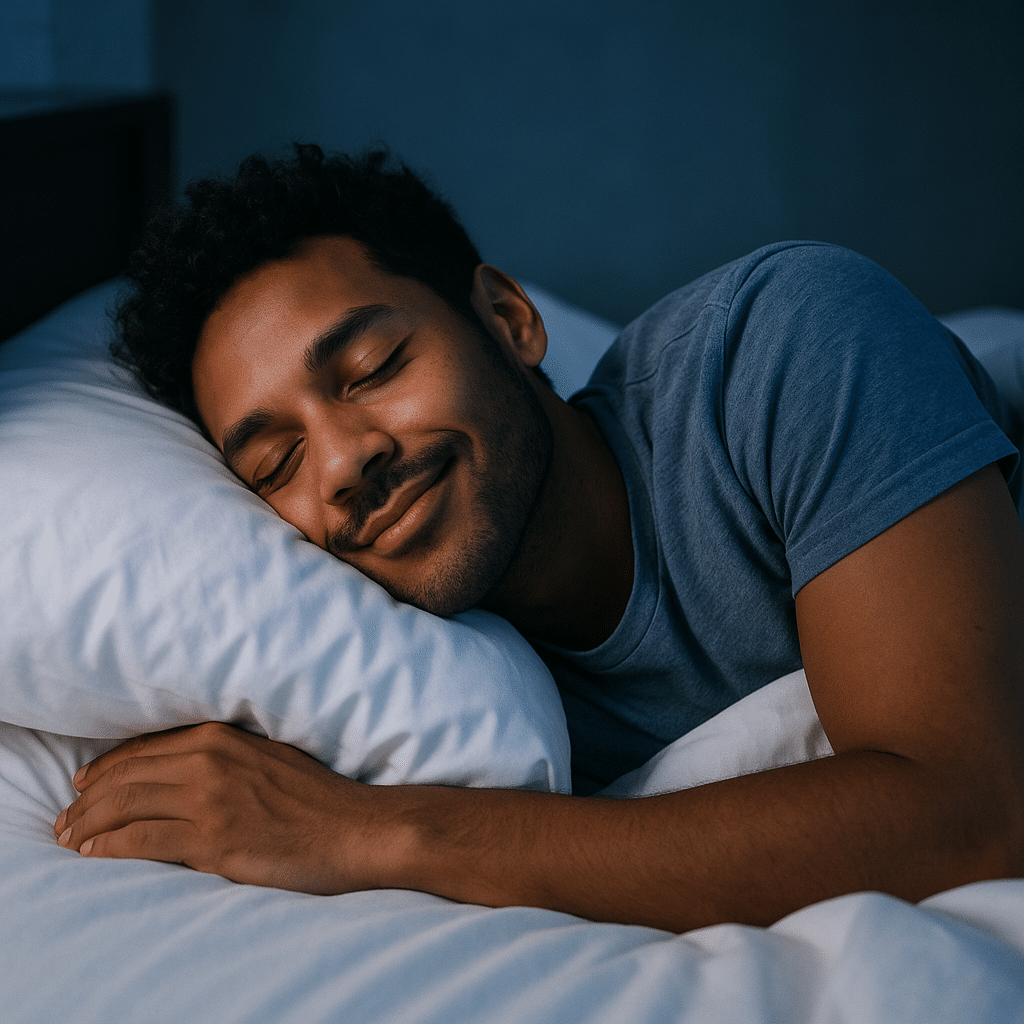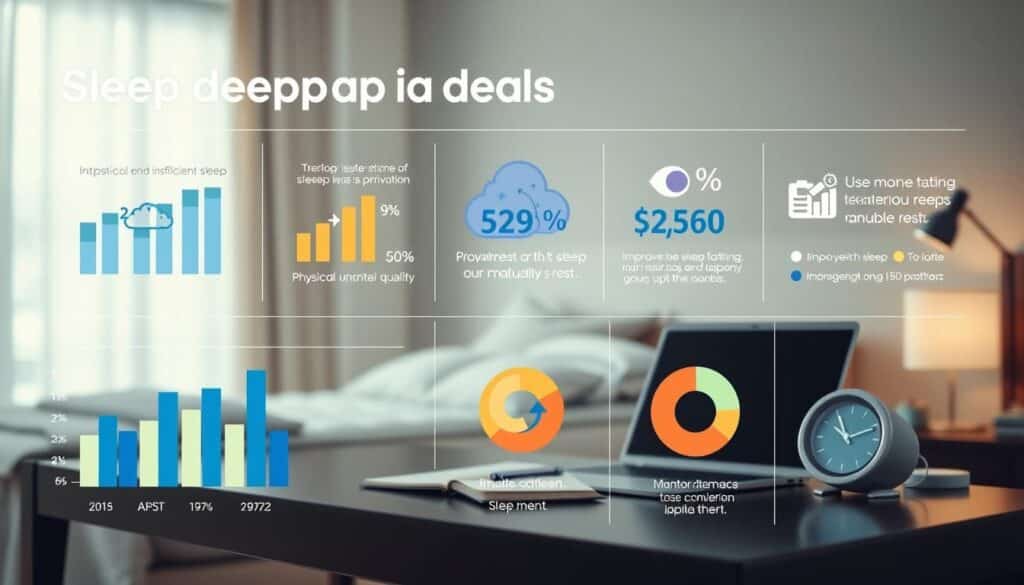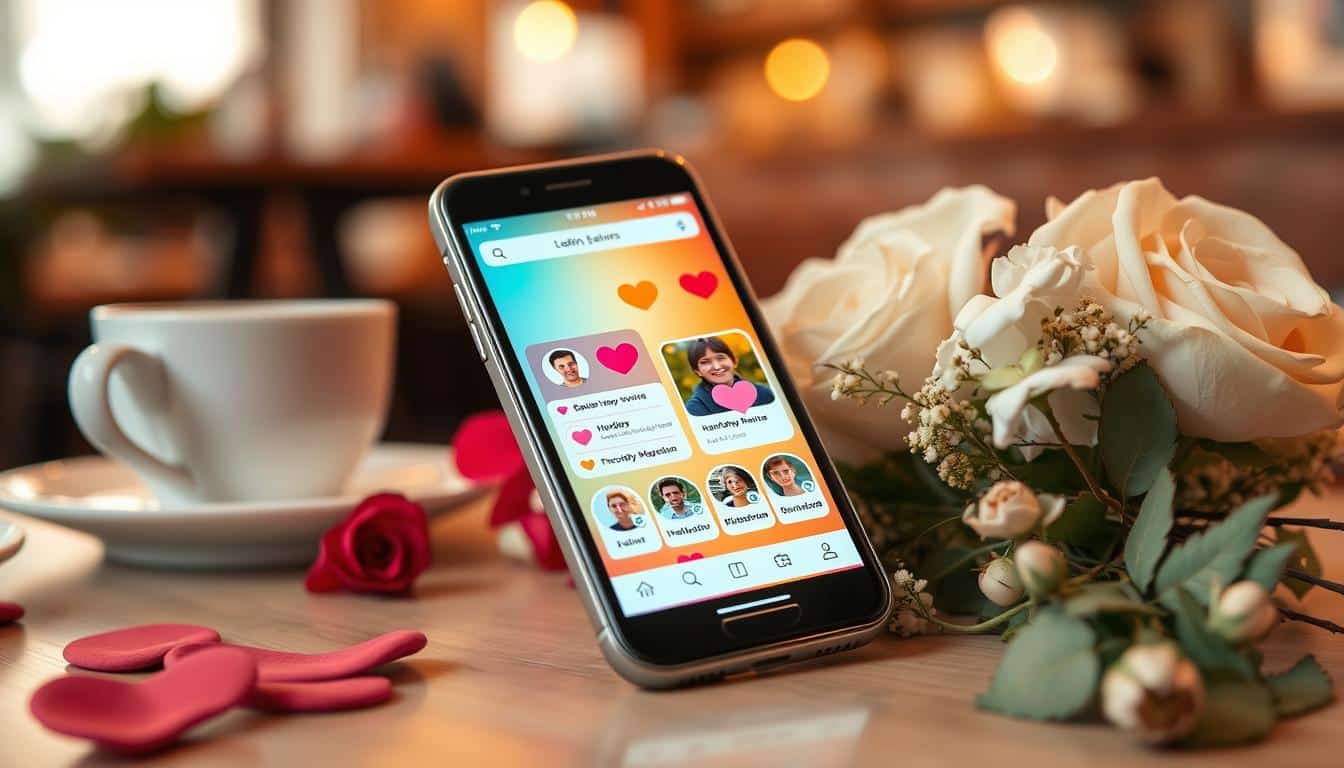Want to sleep relaxed?
In today’s rapid world, good sleep is key for our health. But, getting peaceful sleep is getting harder for many. A Relaxing Sleep App can be a great help, turning tough bedtimes into calm moments. These apps have calming sounds, guided meditations, and sleep plans you can tailor. They help people form better sleep patterns. This could be the perfect way to improve your sleep.

Relaxing Sleep App
The Importance of Quality Sleep
Getting enough sleep is key to our well-being. About 1 in 3 adults in the U.S. don’t meet the recommended seven hours of sleep per night. This shortage impacts work performance, mental sharpness, and emotional stability.
Statistics on Sleep Deprivation
Sleep is more important than some might think. Facts show many adults can’t sleep well due to stress, how they live, and distractions from technology. The CDC says not sleeping enough can make it hard to get through the day, at work or home.
Health Impacts of Insufficient Sleep
Not sleeping enough can lead to major health problems. Issues can range from heart disease to weight gain, and even make anxiety and depression worse. It also raises the risk for diabetes and metabolism issues. So, it’s very important to make sure we get enough rest.

Understanding Relaxing Sleep Apps
In today’s busy world, people look for ways to improve their sleep. Sleep apps are great tools for this. They teach relaxation, educate on sleep, and track how you sleep. They use your phone’s features to help you sleep better.
What Are Sleep Apps?
Sleep apps are made to help you sleep better. They have features for relaxation and learning about sleep habits. With personalized tips and insights, they make it easy to get better sleep each night.
Types of Features Offered
The features in sleep apps differ to meet various needs. Some common ones include:
- Relaxing music and soundscapes that create a calming environment.
- Guided meditations to reduce anxiety and prepare the mind for sleep.
- Advanced sleep tracking technology that monitors sleep patterns and provides insights.
- Alarm systems designed to wake users gently at optimal times.
- Bedtime story narratives that engage listeners and promote relaxation.
How to Choose the Right Sleep App
Finding the right sleep app means looking at several key things. It’s important to spot the key features that will make the app work well for you. Try different apps to see which one fits your needs the best.
Key Features to Consider
Some features really matter when you’re choosing a sleep app:
- Customizability of sounds
- Meditation options
- Sleep tracking accuracy
- Reminders for healthy sleep habits
- User interface and ease of navigation
These features are critical for getting good rest. Make sure the app you pick has these for a better experience.
Reading User Reviews and Ratings
Looking at what others say about an app is very helpful. User reviews and ratings show if an app is effective. Generally, apps with high ratings and positive feedback are a good bet for better sleep.
Relaxing Sleep App: Benefits for Users
Relaxing sleep apps are changing the way we end our days. They work by calming our minds and ensuring we get good sleep. This leads to a big positive change in both our sleep and mental health.
Improved Sleep Quality
Using these apps brings better sleep quality, with sounds and meditations that soothe. Studies show they make sleep deeper and less interrupted. This shows how essential they are for a refreshing sleep journey.
Reduced Stress and Anxiety
These apps also help reduce stress before bed. They offer routines that relax you, like deep breathing and mindfulness. This helps in creating a peaceful mind ready for sleep. The apps are key in improving emotional health.
Popular Features of Sleep Apps
Many people now use sleep apps to get better sleep at night. These apps have features like relaxing music, calming sounds, and guided meditations. They work together to help you sleep better.
Relaxing Music and Sounds
Many sleep apps have a big selection of calming sounds and music. You can choose from nature sounds, ambient noise, and soothing tunes. These help you relax and fall asleep easier.
The sounds in these apps make it easier to sleep well. They help create a perfect setting for rest.
Guided Meditations and Breathing Exercises
Adding meditation to your bedtime routine can help you feel less anxious and more at peace. Sleep apps often have guided meditations and breathing exercises. These are designed to meet different needs.
These practices help you relax before sleep, leading to a better rest. They are great for anyone looking to improve their sleep.
Top Relaxing Sleep Apps Available
Finding the perfect sleep app can make a big difference in your sleep quality. The Calm Sleep app and the White Noise app are top choices. They have special features to help you sleep better.
Calm Sleep: Creating a Calm Atmosphere
The Calm Sleep app makes your bedroom peaceful. It has a big selection of relaxing sounds and stories read by famous people. This helps you relax and sleep better. It also teaches you how to sleep better with mindfulness.
White Noise: Harnessing Sound for Better Sleep
The White Noise app is great for those who need quiet to sleep well. It has many sounds that hide annoying noises. This makes it easier for you to fall asleep. It’s simple to use and really effective.
How Sleep Apps Help with Sleep Tracking
Sleep apps are changing how we rest at night. They use technology to show us our sleep habits. This info helps improve our sleep quality. It’s worth looking into their benefits.
Understanding Your Sleep Patterns
Most sleep apps check your movements at night using your phone’s sensors. They track how long you sleep and analyze your sleep stages. This gives you details on deep sleep and REM cycles. You can learn what affects your sleep quality.
By looking at your sleep trends, you can find what helps or hurts your sleep. This can make a big difference in how well you rest.
Integrating Health Tracking Technologies
Many sleep apps work with fitness trackers and smartwatches. This lets you see your health and sleep data together. It gives a full view of your well-being.
Linking your sleep data with other health metrics can reveal what influences your sleep. It helps you spot patterns in your stress and physical activity. This can lead to better sleep and healthier choices.
Affordability of Relaxing Sleep Apps
Looking at relaxing sleep apps, we see both free and paid options. Many apps are free to download, offering basic help for better sleep. But, these free versions might not have everything. To get more features, users can sign up for a subscription. These usually cost $5 to $10 a month or $50 to $80 a year. There’s often a free trial to try before you buy.
Free vs. Subscription Models
Free sleep apps offer simple features, enough for some users. But, if you want more, like custom sleep plans or lots of sounds, a paid subscription is needed. The cost of these subscriptions changes from one app to another. For those focused on improving sleep and health, paying for a good sleep app is worth it.
Long-term Value of Using Sleep Apps
Paying for a sleep app can boost your health over time. Better sleep can make you feel well and cut down on sleep problem costs. With regular use, many find their sleep gets much better. So, the price of a sleep app is a smart investment in your health.
Are Sleep Apps Suitable for Everyone?
Sleep apps suit different people, especially when you consider their ages. Many are designed for kids but help adults too. It’s essential to match the app with the user’s age for the best results.
Age Considerations for Sleep Apps
Most sleep apps target adults with features like sounds and meditations. But, they also offer kids’ stuff, such as stories and music. Always check age advice to ensure the app fits the user well.
- Adults get tracking and relaxation aids.
- Teens might like mindfulness tasks.
- Kids can enjoy sleep-inducing stories.
Who Should Use Sleep Apps?
Different ages benefit from sleep apps if facing sleep issues. They’re great for anyone wanting better sleep quality, from managing stress to creating healthy sleep habits. Here’s who they help:
- Those with sleep problems.
- People needing stress relief.
- Anyone looking to improve sleep.
Challenges and Limitations of Sleep Apps
Sleep apps are now a modern solution for sleep troubles. But, users should know their limits compared to tried-and-true methods. Traditional sleep techniques are based on years of research and practice.
Effectiveness Compared to Traditional Methods
Studies on sleep apps don’t have clear results, especially against methods like cognitive-behavioral therapy (CBT-I). While offering relaxation or tracking, they may not solve deep sleep issues. So, it’s key to use these apps wisely and know their boundaries for serious sleep problems.
User Dependency on Technology
Many folks lean on technology to get some sleep, sparking worries about becoming too dependent. This reliance can make it tough to sleep well without tech help. And, stopping app use might harm sleep quality. Mixing tech with natural sleep methods is essential for good sleep routines.
Testimonials and Experiences from Users
Many folks talk about how sleep app experiences have changed their lives for the better. They share success stories that show how sleep apps have improved their sleep routines.
Success Stories with Sleep Apps
Users saw big improvements in how well and how long they sleep. Here are some success stories:
- Enhanced sleep quality leading to increased energy levels throughout the day.
- Reduction in anxiety levels attributed to better sleep hygiene.
- Improvement in overall mental health, with many expressing feelings of calmness and less stress.
Common Concerns Raised by Users
Yet, alongside these benefits, users have pointed out some issues with sleep apps. They’ve raised concerns about:
- Costs associated with premium features and subscription models.
- Concerns about the usability of certain apps and the learning curve involved.
- Data privacy worries related to the information collected by sleep tracking technologies.
By addressing these issues, we can make sleep apps even better. This will lead to more positive user testimonials and experiences.
Conclusion
In our fast-paced lives, getting good sleep is more important than ever. It keeps us healthy and happy. Relaxing sleep apps can make a big difference in our sleep quality.
These apps work by improving our sleep. They have many features like calming sounds and guided meditations. These help us chill out and sleep better.
They also track our sleep and give us helpful tips. This means we can sleep better and live healthier. Using a relaxing sleep app can change how we get ready for bed. It helps us sleep deeper and feel more refreshed.



